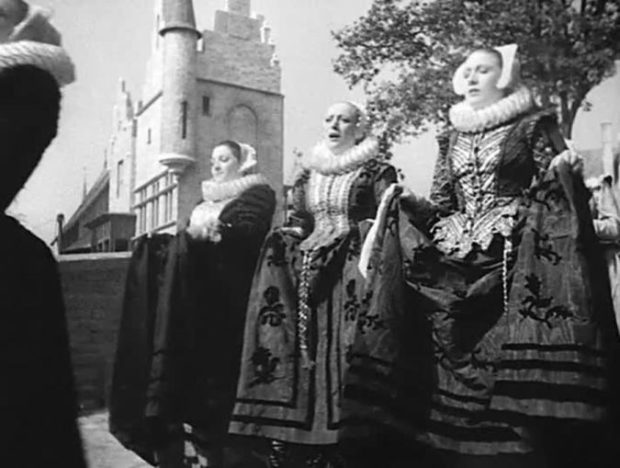 Jacques Feyder's 1935 comedy, about the women of a Flemish town disarming an occupying Spanish army with wit and charm, embodies the lost ideals of an earlier time.
In 1935, Hitler had been in power in Germany for two years. The rest of Europe desperately hoped that the disaster that was the Great War of 1914 to ‘18 would not be repeated. It was too horrible to contemplate, even though German rearmament made the prospect impossible to ignore. It was against this historical background that the distinguished French director Jacques Feyder made a film dramatizing the tensions between two countries back in the early 17th century. Adapted from a story by the Belgian writer Charles Spaak, it’s Carnival in Flanders.
Flanders was a Dutch-speaking country that is now the northern part of Belgium. Along with The Netherlands, it was controlled by the Spanish empire for about 150 years, until popular revolt forced the Spanish out in 1714. These facts would be fairly common knowledge for European audiences in 1935; not so much now.
Anyway, Carnival in Flanders takes place in the year 1616. The government of a Flemish town named Boom learns that a Spanish duke is on his way with his army to occupy the town. The whole population is on the verge of panic. The Spanish are known as rapists and butchers, and the fear of chaos and carnage runs rampant. The burgomaster, or what we could call the mayor, played by André Alerme, decides to fake his own death, lying in state in the hope that the Spanish will respect the town’s official decree of mourning and leave quickly. The rest of the aldermen, and most of the men in the town, decide to lie low and basically go into hiding during the crisis. This act of mass cowardice places the responsibility for protection in the hands of the town’s women, headed by the burgomaster’s clever and resourceful wife Cornelia, played by the magnificent Françoise Rosay. Thus begins one of the most delightful film comedies ever conceived.
Part of the greatness of Carnival in Flanders is its impeccable production design. Feyder’s team created a beautiful and convincing replica of a Renaissance-era Flemish town, both in its buildings and costumes. They studied the art of the time (in fact one of the characters is a young portrait painter) and they succeeded in making the entire film look like a work by Bosschaert or Jan Breughel.
The women defend the town with the weapons of wit and charm. And this isn’t just the idea of using their feminine attractions, so to speak, although that is an element here. They also employ fine manners, generosity, intelligent conversation, and subtle flattery. The Spanish duke, played by Jean Murat, is won over by Madame Cornelia, and the mayor must continue to play dead while his wife flirts with the enemy. The picture is filled with amusing incidents and plot details, in which the men appear increasingly ridiculous and the women confident and in control.
I adore this movie, in which the brave, witty women of a town triumph over the men. It's a memento of a wonderful dream that is now lost forever: that love and friendliness has the power to tame human savagery. It was banned in Belgium for insulting national manhood. Here in the U.S. it was condemned by the Legion of Decency for its free morals. We never see anything that could be referred to as indecent—this was 1935 after all—but just the hint of it was enough to outrage conservatives. And Nazi Germany banned it as well, for its pacifism. But despite all this, the film was a huge international hit.
Then, after World War II was over, critics attacked it for supposedly advocating collaboration. I can almost understand this too: from the jaded perspective we must now adopt after the horrors of the 20th century, the film can certainly seem naïve when it comes to political realities. But in its time, Carnival in Flanders was just a wonderful breath of fresh air, a reminder of the love and humor that still lived in the human heart, and a testament of hope that maybe, for once, society could just trust the women to take care of things.
Jacques Feyder's 1935 comedy, about the women of a Flemish town disarming an occupying Spanish army with wit and charm, embodies the lost ideals of an earlier time.
In 1935, Hitler had been in power in Germany for two years. The rest of Europe desperately hoped that the disaster that was the Great War of 1914 to ‘18 would not be repeated. It was too horrible to contemplate, even though German rearmament made the prospect impossible to ignore. It was against this historical background that the distinguished French director Jacques Feyder made a film dramatizing the tensions between two countries back in the early 17th century. Adapted from a story by the Belgian writer Charles Spaak, it’s Carnival in Flanders.
Flanders was a Dutch-speaking country that is now the northern part of Belgium. Along with The Netherlands, it was controlled by the Spanish empire for about 150 years, until popular revolt forced the Spanish out in 1714. These facts would be fairly common knowledge for European audiences in 1935; not so much now.
Anyway, Carnival in Flanders takes place in the year 1616. The government of a Flemish town named Boom learns that a Spanish duke is on his way with his army to occupy the town. The whole population is on the verge of panic. The Spanish are known as rapists and butchers, and the fear of chaos and carnage runs rampant. The burgomaster, or what we could call the mayor, played by André Alerme, decides to fake his own death, lying in state in the hope that the Spanish will respect the town’s official decree of mourning and leave quickly. The rest of the aldermen, and most of the men in the town, decide to lie low and basically go into hiding during the crisis. This act of mass cowardice places the responsibility for protection in the hands of the town’s women, headed by the burgomaster’s clever and resourceful wife Cornelia, played by the magnificent Françoise Rosay. Thus begins one of the most delightful film comedies ever conceived.
Part of the greatness of Carnival in Flanders is its impeccable production design. Feyder’s team created a beautiful and convincing replica of a Renaissance-era Flemish town, both in its buildings and costumes. They studied the art of the time (in fact one of the characters is a young portrait painter) and they succeeded in making the entire film look like a work by Bosschaert or Jan Breughel.
The women defend the town with the weapons of wit and charm. And this isn’t just the idea of using their feminine attractions, so to speak, although that is an element here. They also employ fine manners, generosity, intelligent conversation, and subtle flattery. The Spanish duke, played by Jean Murat, is won over by Madame Cornelia, and the mayor must continue to play dead while his wife flirts with the enemy. The picture is filled with amusing incidents and plot details, in which the men appear increasingly ridiculous and the women confident and in control.
I adore this movie, in which the brave, witty women of a town triumph over the men. It's a memento of a wonderful dream that is now lost forever: that love and friendliness has the power to tame human savagery. It was banned in Belgium for insulting national manhood. Here in the U.S. it was condemned by the Legion of Decency for its free morals. We never see anything that could be referred to as indecent—this was 1935 after all—but just the hint of it was enough to outrage conservatives. And Nazi Germany banned it as well, for its pacifism. But despite all this, the film was a huge international hit.
Then, after World War II was over, critics attacked it for supposedly advocating collaboration. I can almost understand this too: from the jaded perspective we must now adopt after the horrors of the 20th century, the film can certainly seem naïve when it comes to political realities. But in its time, Carnival in Flanders was just a wonderful breath of fresh air, a reminder of the love and humor that still lived in the human heart, and a testament of hope that maybe, for once, society could just trust the women to take care of things.

The Classic Pick of the Week for the week of September 16, 2019 - the final album from The Beatles, Abbey Road, released 50...

Todd Miller discusses his upcoming new book Border Patrol Nation available in February from City Lights Books. For the past 15 years Todd Miller...

Learn about Green-Themed events around Tucson in November. And, find out how to locate rebate programs such as water harvesting/energy efficiency. And, info on...